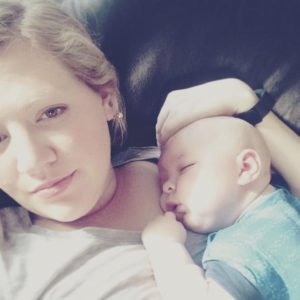By the third time, you’d think you’d be used to something, but when I had my third miscarriage a few months ago, the pain cut just as deeply as it had the first and second times around. As the doctor searched for a heartbeat and the screen stayed still and black, my eyes began to well. “Not again, not again, not again,” I willed, as I shut my eyes tightly and hoped for the telltale thump-thumping that would indicate this was all some sort of mistake. It never came though, and by the end of the day, my lifeless baby, already so loved and wanted, had been scooped from my belly and I’d been sent home to rest. It’s a cruel thing, to wake up in the morning pregnant and go to bed with an empty womb.

In the weeks that followed I wallowed in my grief, but I tried my best to keep busy. I took my toddler and my kindergartener apple picking. I went to the grocery store. I tried to keep up with work. But as my belly shrank and the soreness that had settled into my breasts over the last 12 weeks dissipated, I often found myself on the verge of tears.
It’s a cruel thing, to wake up in the morning pregnant and go to bed with an empty womb.
As I had before, I searched for answers on how to move on, to honor my loss, to grieve effectively, but neither religious nor scientific explanations resonated. Desperate for relief from the crushing pain, I asked my therapist for a guide to dealing with my grief. A manual. A rulebook. Anything. I needed something to tell me how to get through this and to a place where I could miss my baby, and all the potential and promise the pregnancy had brought, but somehow still be OK. But there is no rulebook, and there’s a significant lack of resources available to women experiencing a pregnancy loss. So having been there too many times, I decided to write the guide I needed, in hopes that it might help others too.
***
On the day you find out that your baby won’t be joining you earthside, cry. Let yourself feel all your feelings. Wail. Sob. Or, don’t. If you’re still in shock or the tears aren’t coming, don’t feel bad. Pregnancy loss is complicated, and it’s normal to feel a range of emotions on the day you lose something you never quite had.
But there is no rulebook, and there’s a significant lack of resources available to women experiencing a pregnancy loss.
If you have one, draw your partner in close. Tell them your feelings and let them see you mourn. Listen to them as they mourn. Take comfort in being together and find gratitude for one another. Or, don’t. It’s OK to want to be alone. To process your thoughts on your own. To try to get comfortable with the understanding that you and your partner might grieve differently. Grief is a hard emotion to weather, and whether you seek comfort in companionship or solitude, it’s the right way to grieve if it feels right to you.

Telling people about your loss can be one of the most difficult parts. But reach out to your friends and family for support. Share the news. Know that they might not know what to do or say, so ask for what you need, whether it’s a hot meal or some time together or a little space. Or, don’t. There is no rule about how soon you have to tell anyone about what happened. If the conversation feels too difficult to have today or tomorrow or the next day, don’t have it. In fact, don’t have it at all if you don’t want to. Have your partner tell whoever needs to know and that you’ll reach out if and when you’re ready. It’s normal to want to talk about your loss, but it’s also normal not to.
If the conversation feels too difficult to have today or tomorrow or the next day, don’t have it.
When you’re feeling lost and disconnected from your body, moving it can help you feel better. Go for a walk. Get some fresh air. Do whatever form of exercise you enjoy. Or, don’t. Throw yourself in bed and stay there for a few days. Wrap yourself in the covers, turn out the lights, and sleep away the pain. Move when it feels right, and be still when it doesn’t.
One of the hardest parts of mourning the loss of a baby that will never be born is that, in some ways, the loss feels vague and unreal. You’ve lost something so big, yet it’s nearly invisible to the outside world. Plant a tree to remember your baby. Buy a necklace with its birthstone. Write your baby a letter. Or, don’t. Note the significance of your loss privately, without a tree or a necklace or a letter. Feel it in your heart, and let that be enough if it feels like enough.
Move when it feels right, and be still when it doesn’t.
When you find out that your baby won’t be coming home to you, that you’ll never hold them or rock them or name them or kiss them, it’s normal to feel a range of emotions, and while there is nothing that can fix the situation or bring you a healthy baby on the due date you were hoping for, there are ways to move through your grief and find your way to a place of peace.
But those ways are up to you. When you lose a baby, do what feels right. Nothing more. Nothing less. And let that, what feels right, be your guide.
Like this piece? Subscribe to our newsletter for real stories about women on their journey to motherhood.
